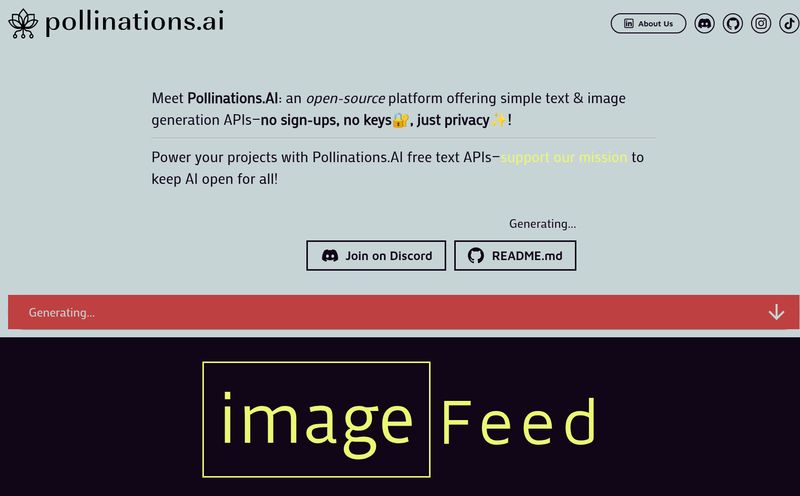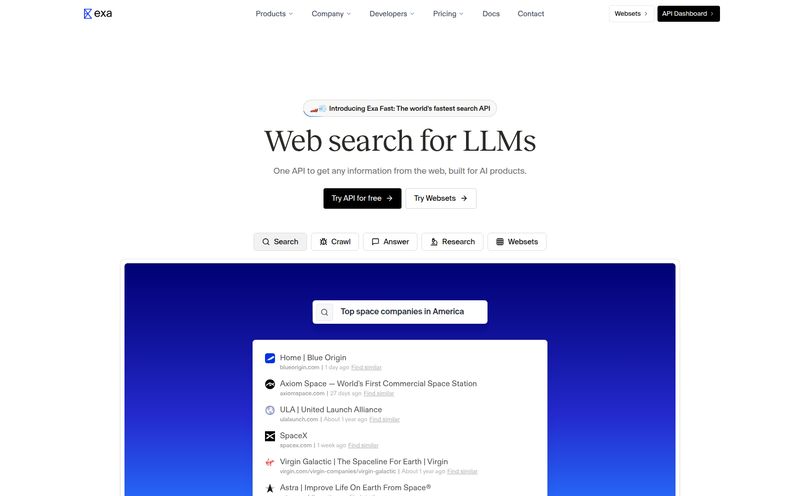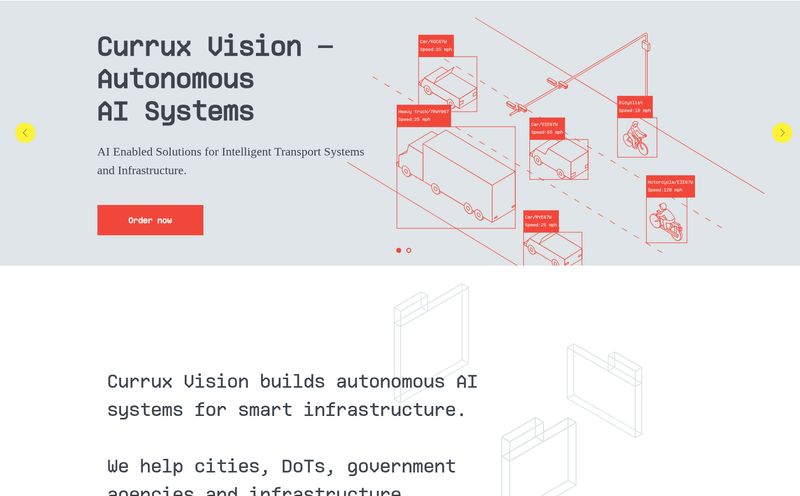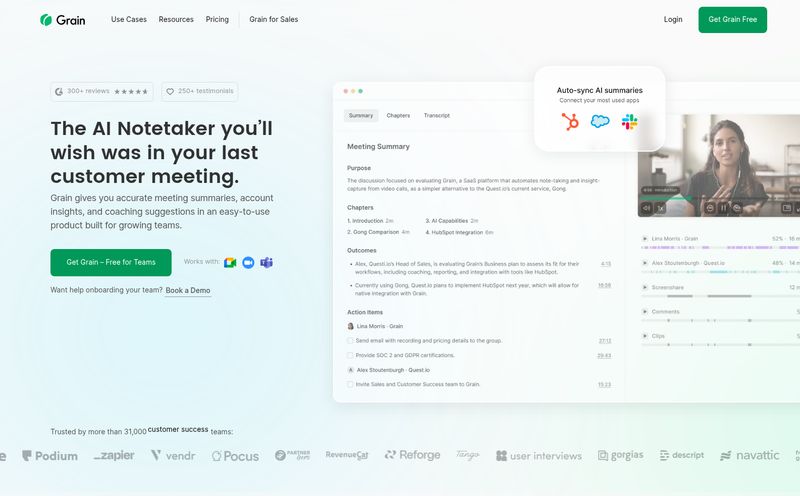We’ve all been there, right? You’re working on a big project—a market analysis, a legal brief, maybe even just a ridiculously detailed blog post—and suddenly your screen looks like a digital collage of chaos. Twenty-seven browser tabs are open, you’ve got three PDFs you meant to read, and you're trying to cross-reference a chart with a quote you saw... somewhere. It’s a research nightmare. For years, I’ve navigated this mess with a mix of caffeine and sheer willpower.
Then the AI boom happened. Tools like ChatGPT made information retrieval faster, but often at the cost of accuracy. It’s great for brainstorming, but ask it for a verifiable source on a niche topic, and it can sometimes… hallucinate. Politely, of course. That's why when I stumbled upon a tool called DeepResearcher.net, which claims to be an online alternative to OpenAI's own Deep Research feature, my interest was definitely piqued.
Is this the AI research assistant we’ve been waiting for? Or just another tool in the ever-growing pile? Let's get into it.
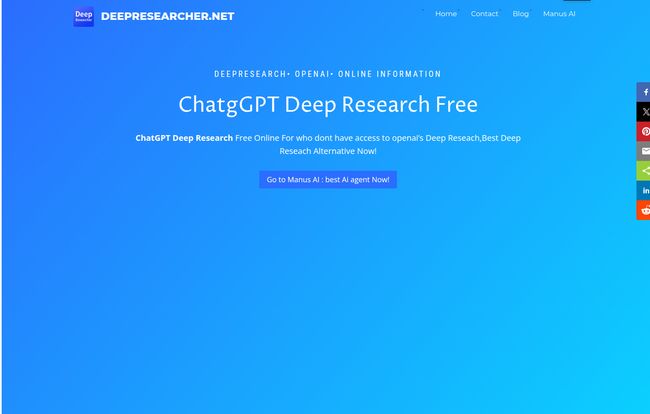
Visit deepresearcher.net
So What Exactly Is DeepResearcher.net?
In a nutshell, DeepResearcher.net is a specialized online tool designed for one thing: in-depth, serious research. It presents itself as an accessible version of OpenAI's exclusive ChatGPT Deep Research feature, built for users who need more than a quick summary. Think of it less like a casual conversation with an AI and more like handing a project off to a meticulous research assistant.
It uses what they call a “specialized version of the o3 model” to crawl online sources, analyze different kinds of content, and stitch it all together into a single, comprehensive report. The real kicker? It provides citations. Clear, verifiable sources for the information it gives you. For anyone in the SEO or content world, you know that’s gold (hello, E-E-A-T).
The Core Abilities That Actually Matter
A tool is only as good as what it can do. Here’s a breakdown of what DeepResearcher brings to the table.
It’s a Research Hound, Not Just a Search Engine
Standard search engines give you a list of links. DeepResearcher goes a step further. It actively browses the web, but more importantly, it has the capacity for reasoning across multiple sources. It can connect the dots between a news article, a scientific paper, and a financial report to form a coherent analysis. This is a huge step up from just pulling up ten blue links and leaving the hard work to you.
It Reads Almost Anything You Throw at It
This was a big one for me. My research folders are a mess of different file types. This tool can process not just text but also images and PDFs. You can upload a document (up to 50MB, which is pretty decent) and have it incorporate that information into its research. It’s a small feature that solves a massive workflow headache.
Showing Its Work with Citations and Audit Trails
This is the main event. The tool generates detailed research reports that don’t just give you the answer, they show you how it got there. With source verification and audit trails, you can trace every piece of information back to its origin. This focus on verified, auditable information is what sets it apart from more general-purpose AI chat models. It’s built for people who can’t afford to be wrong—academics, lawyers, financial analysts, and medical researchers come to mind.
DeepResearcher vs. Your Everyday ChatGPT
So, how is this different from just firing up the standard ChatGPT? It’s a question of purpose. Think of it like this: ChatGPT is a brilliant, well-read friend you can ask about anything. They’ll have a fantastic, articulate answer for most things, but they might occasionally misremember a detail or confuse one source with another. Hey, it happens.
DeepResearcher, on the other hand, is the professional research librarian. They won’t just give you the answer; they’ll hand you a neatly compiled dossier with footnotes, a bibliography, and highlighted passages from the original documents. It's less about conversation and more about constructing a verifiable, evidence-based argument. The specialized model is tuned for accuracy and source attribution above all else.
Let's Talk Turkey: The Pricing Structure
Alright, how much does this focused power cost? The pricing seems tiered based on your access level to ChatGPT itself, which is an interesting approach.
- ChatGPT Pro Users: For $20 a month, you get full access to the tool with a cap of 100 queries. This seems like the main offering and is pretty reasonable for professionals who would use this regularly.
- Plus/Teams Users: These users can get in on a limited beta, which provides 20 queries per month. It’s a good way to test the waters without a full commitment.
- Enterprise Users: As is typical, this is a “Contact us for a quote” situation. They offer custom plans, which makes sense for large organizations with specific needs.
The 100-query limit for the Pro plan is something to keep an eye on. For a heavy research month, you could burn through that. But for targeted, complex inquiries, it should be plenty.
The Not-So-Perfect Parts (Because Nothing Is)
I believe in honest reviews, so let’s look at the downsides. This tool, while powerful, isn't perfect. First, there are no real-time data updates. The information it pulls is from its last crawl, so for fast-moving topics like stock market analysis or breaking news, it might lag. You'll still need to double-check for the very latest developments.
The language support is also limited to 25 non-English languages. Great, but not global. The 50MB file upload limit is generous but could be a constraint for someone analyzing a massive, high-resolution document.
And for the developers and automation nerds out there (my people!), the biggest letdown is probably the lack of API access until 2026. That's a long time to wait to integrate this power into other workflows. Though, to be fair, the primary audience here seems to be hands-on researchers, not developers.
My Final Verdict: Is DeepResearcher.net Worth Your Time?
Here’s the thing. If you’re a student, a professional, or a content creator who regularly wades into complex subjects, this tool could genuinely change your workflow. It automates the most tedious part of research—the gathering and citation—so you can focus on the most important part: the thinking.
It’s not a replacement for your brain. It’s a force multiplier for it. The emphasis on verified information is, in my opinion, the correct direction for practical AI. While I was poking around their site, I did notice some parts seemed to be under construction (I hit a classic 404 page trying to find their blog), but the core product is solid and focused.
For $20 a month, if you fall into its target demographic, the value is definitely there. It could save you hours of painstaking work on a single report. For the casual user? Probably overkill. Stick with your regular AI assistant. But for the deep work? Yeah, this is one to watch.
Frequently Asked Questions
1. What is DeepResearcher.net in simple terms?
It's an online tool that acts as an alternative to OpenAI's ChatGPT Deep Research. It's designed to perform in-depth research on complex topics, analyze various documents, and generate detailed reports with verifiable sources.
2. What kind of files can I upload for analysis?
You can upload various content types, including text files, images, and PDFs. There is a maximum file size limit of 50MB per file.
3. Which industries would benefit most from this tool?
Based on its features, professionals in finance, law, healthcare, and academia would find it particularly useful due to its focus on accuracy and source citation for complex, domain-specific questions.
4. How is this different from the regular ChatGPT?
The main difference is specialization. DeepResearcher uses a model specifically tuned for deep research and source verification. It prioritizes creating auditable, citation-backed reports over the general-purpose conversational abilities of standard ChatGPT.
5. Is the information always 100% accurate and up-to-date?
The tool is designed for high accuracy with its specialized model. However, it does not have real-time data access, so the information is only as current as its last data crawl. Users should always verify time-sensitive information.
6. When will an API be available?
According to the information available, API access is not planned until 2026.
Closing Thoughts
The world of AI tools is getting crowded, and it's easy to get cynical. But every now and then, a tool comes along that isn’t just a novelty but a genuine problem-solver. DeepResearcher.net feels like one of those. It’s not flashy, but it’s focused, practical, and addresses a real pain point for anyone who has ever felt the dread of a looming research deadline. It's a promising step toward making AI a truly reliable partner in the quest for knowledge.
